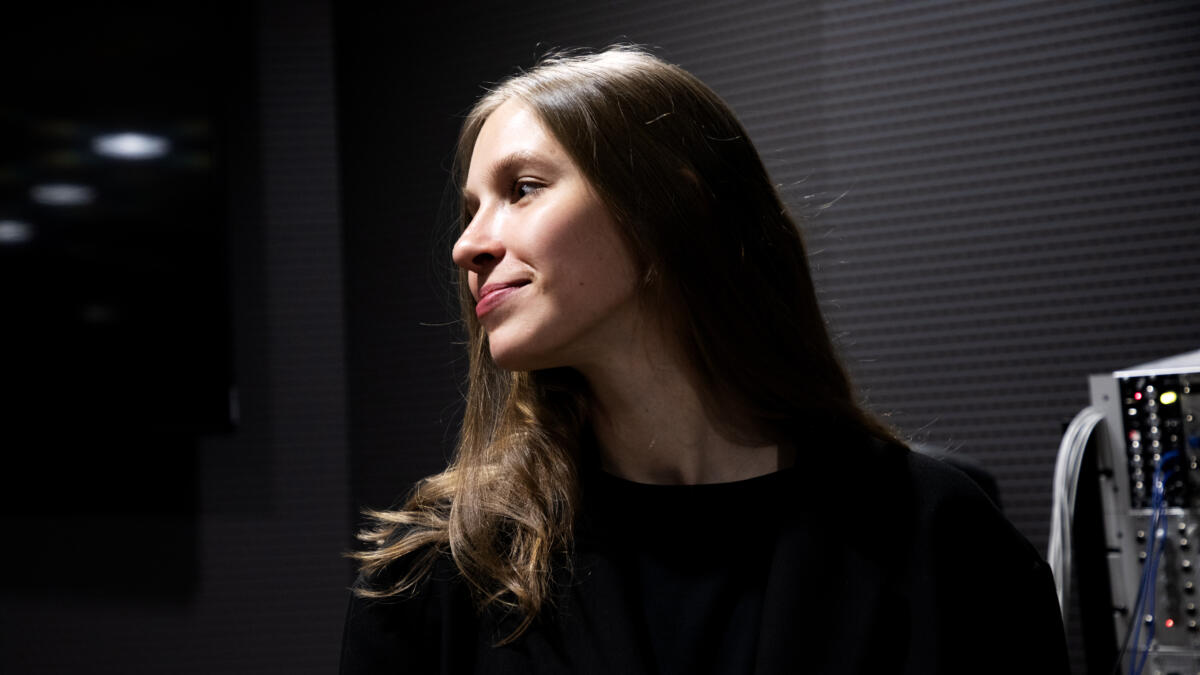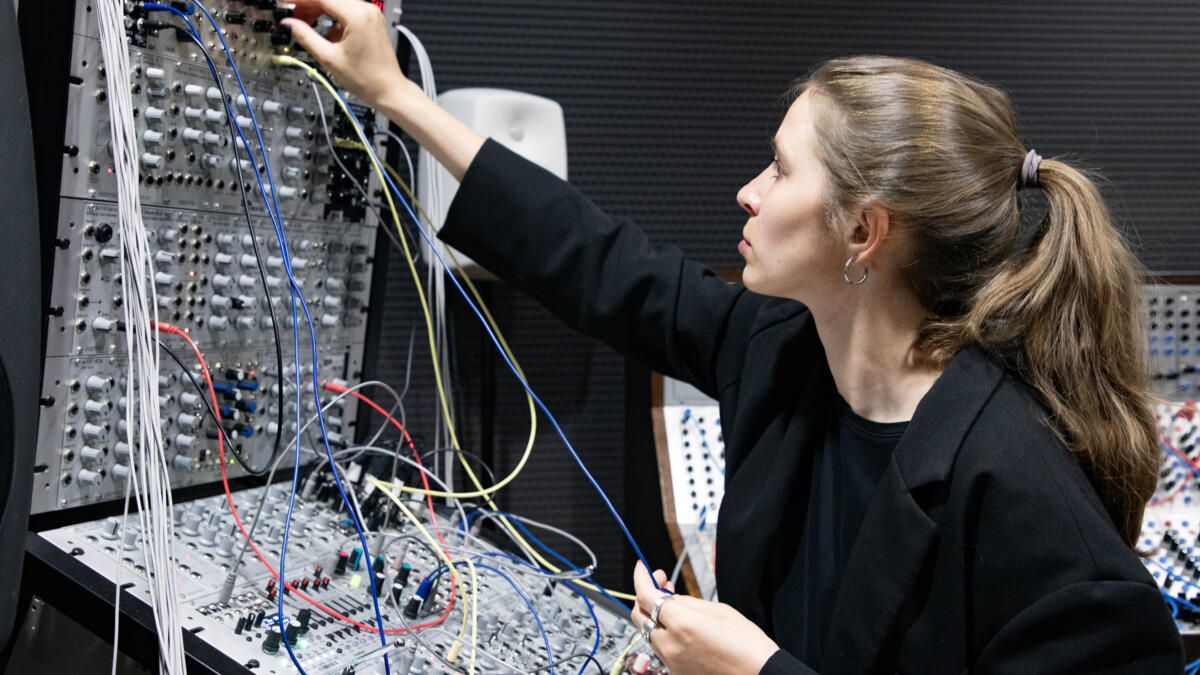Music Technology student: When I entered the classroom for the first time, I fell in love with the community
Read Sofija Zaiceva’s insights on studying music technology at the Sibelius Academy of Uniarts Helsinki.

Who are you and what inspired you to pursue studies in music technology at the Sibelius Academy?
I’m Sofija Zaiceva, a performer and master’s student in Music Technology at the Sibelius Academy. I’m originally from Latvia but I have lived all around Estonia and in Belgium. I have two bachelor’s degrees: in classical piano performance from the Latvian Music Academy and in electroacoustic composition from the Estonian Academy of Music and Theatre.
All my life, I’ve been performing with instruments. Right now, I perform with sound, experiment with music, composition and improvisation. That’s why I chose to study here. The Music Technology programme is all about creativity, about the sound itself, its sonic aspects and technical aspects – which is not the case in many places.
When I entered the classroom for the first time, I fell in love with the community. We all want to learn. It’s very inspiring. We all have the same goal.
What initially drew you to the field of music technology?
It connects together everything that I do. I also work and perform as a DJ. That’s how I started getting interested in electronic music. I realised piano is not enough for me and I wanted to learn how to make this kind of music. I try not to shy away from different genres. I want to immerse myself in different perspectives in terms of sound.
Can you tell us one thing you remember about applying or your entrance examination?
I have this philosophy that it is the least stressful part of my studies. I felt safe, it was a pleasant experience. Of course it’s hard, too. You have to prepare a lot of documents, your master’s proposal and how you present yourself and your goals.
We also had to play an instrument or do a vocal performance. I played the piano, Schumann. I was fully in the moment. It gave me so much confidence.
Could you give an overview of what studies in music technology entail? What specific skills and techniques do you focus on?
At the moment, we have three main lines of studying: Recording arts, Film and game music and Creative electronic music practices, with skills ranging from sound engineering to computer music and programming.
All of them are connected. We’re learning about both digital and analogue sound. We gain experience by engaging with knowledge that has existed before, while simultaneously looking towards the future.
I’m more focused on the performative part. Coding is my main interest, creative processes combined with technical skills. My studies include creative coding, analogue synthesisers, building your own instruments with the inclusion of electronics, improvising, and how we interact with all the technology. I also have lectures on the history of music, performance and composition.
How would you describe the interaction between teachers and students in your department?
The teachers always try to create a very personal approach to your situation. They give a lot of advice on what kind of courses I could take. I’ve been able to choose different one-on-one lessons.
The interaction is very respectful and on the same level. It’s musician to musician. It’s very rare. I was surprised to have all this power to choose my personal path within studies.
As a student of music technology, what unique opportunities or resources does the Sibelius Academy offer to support your growth and development in this field?
We have extremely well-equipped studios – for music for film, spatial sound (making ambisonic recordings, performing with spatial dome), a wide range of synthesisers. When you’re just starting, learning the skills, this high-quality equipment helps you experiment and understand which field interests you.
We also have opportunities for exchanging knowledge outside Finland, creative trips and workshops with students in other countries. I’m soon going to Stockholm with fellow students, for instance, to perform in an ambisonic dome. Participating in a concert and presenting our work to colleagues help us explore opportunities for our future profession.

Could you describe a particularly memorable project or experience you’ve had during your studies so far?
I had the chance to participate in the performances of the NYKY Ensemble as an electronic performer. It was an incredible opportunity to work in a big group in a big production – the community, the networking experience, the communication. It was an opportunity to see how you can contribute to a big project with electronics, sound, scenography, lighting. I felt my knowledge widened a lot.
How do you balance the technical aspects of music technology with artistic expression and creativity in your studies?
I try to go out of my comfort zone, implement technical skills already when I’m learning them. Opportunities and knowledge are meant to be explored. When I’m learning new techniques, I always imagine how I would apply them in practice.
I also did an improvisation course and gained so much perspective about performing in a bigger group of six to seven people. I learned a lot from others even though I have done improvisation for many years.
What do you enjoy most about living and studying in Helsinki, and how does the city contribute to your education and overall experience?
It’s a place with the most advanced technology I’ve experienced before. Helsinki is extremely nice, with great transport and amazing concert halls. We have a contemporary art museum just in front of our building.
It’s easy to participate and extend your artistic practice in other fields. You can go to the library and 3-d print something. I just printed a stand for my synthesiser. You learn coding and more specialised programmes. For example, I have learned visual arts programmes that I can apply to different spheres of my work.
How do you envision your role in the music technology world evolving after completing your studies?
I have a dream that I will teach creative coding. I want to bring it to more people. It helps technologists and people in many other fields. I want to perform basically everything I’m learning now. I’m creating my personal style and constantly learning new things to bring to music technology in the future.
(Editor’s note: At this point, a rabbit showed up behind the big window glass next to our table in the café of the Helsinki Music Centre in downtown Helsinki. It just happens that Sofija’s last name Zaiceva means rabbit!)
What advice would you give to prospective students interested in studying music technology at the Sibelius Academy?
You have to be honest with yourself and really decide what’s best for you. What you want to explore, as a performer or a composer, or collaborate with others as a sound engineer and producer. Here people appreciate showing your personality and sharing your views. It reads through. You will get whatever you want.